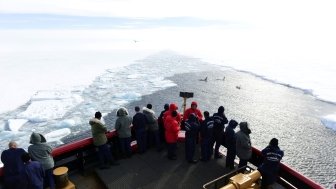Dr. John Carlstrom
Guest Speaker
Professional Affiliation
Subrahmanyan Chandrasekhar Distinguished Service Professor at the University of Chicago with the Astronomy & Astrophysics and the Physics departments
Expert Bio
John Carlstrom is the Subrahmanyan Chandrasekhar Distinguished Service Professor at the University of Chicago with the Astronomy & Astrophysics and the Physics departments. Dr. Carlstrom leads the 10 meter South Pole Telescope (SPT) project at the National Science Foundation’s Amundsen-Scott South Pole Research Station, which is used to investigate the make-up and evolution of the universe through measurements of the 14 billion year old relic radiation from the big bang.
Dr. Carlstrom pursues his in observational cosmology using new instruments to measure the temperature and polarization anisotropy of the Cosmic Microwave Background (CMB) radiation. He has been using instruments at the South Pole for over two decades. He was the director of the Center for Astrophysical Research in Antarctica, an NSF Science and Technology Center. His earlier Degree Angular Scale Interferometer experiment at the South Pole revealed the microwave background's long-sought polarization. He led efforts to study the distortions in the microwave background created by massive clusters of galaxies, the Sunyaev-Zel’dovich (SZ) effects, and with the SPT made the first discovery galaxy clusters through surveys of the SZ distortions in the CMB. The SPT is now conducting sensitive polarization-sensitive CMB survey observations and in 2013 made the first detection of B mode polarization, a significant milestone in the search for primordial gravitational waves generated at the dawn of time. The SPT measurements are used to place constraints on the energy scale of inflation, the number and masses of the neutrinos, the properties of dark energy, the reionization of the universe, and on the first bursts of star forming galaxies in the universe. The SPT is also an important element the Event Horizon Telescope, the world-wide network of telescopes working together to image the shadow of massive Black Holes, including the one at the center of our Galaxy.
Dr. Carlstrom received his Ph.D. in Physics from the University of California, Berkeley. He has received numerous honors in recognition of his research, including a NASA Medal for Exceptional Scientific Achievement, a John D. and Catherine T. MacArthur Fellowship, a James S. McDonnell Centennial Fellowship, the Beatrice M. Tinsley Prize of the American Astronomical Society, and the Magellanic Premium Medal of the American Philosophical Society. In 2015 he shared the Gruber Cosmology Prize for his work on advancing a new model of the universe. He is a member of the National Academy of Sciences and the American Academy of Arts and Sciences.
Insight & Analysis by Dr. John Carlstrom
- Past event
- Governance
Antarctica: U.S. Research and Diplomacy on the Southern Continent


